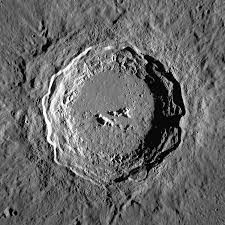China discovers new type of mineral on Moon
A new type of crystal was discovered by researchers in China from the near side of the Moon.
Key facts
- The newly discovered crystal was named Changesite-(Y) after the Chinese moon goddess Chang’e.
- This small and transparent crystal was found among the volcanic debris of the near side of the moon.
- It is more than a billion years old and its width is almost comparable to human hair.
- It has a unique composition and is related to other minerals found only found on the lunar surface or in meteors.
- The crystal was found among the 1.8 km of lunar rocks brought back by Chang’e-5 mission in 2020.
- These samples are the first to the delivered to the Earth from Moon since 1976 and the first ever lunar samples collected by China.
- The Changesite-(Y) crystal is the sixth new mineral to be discovered on the Moon and the first identified by China. The previous 5 discoveries were made by either the United States or Russia.
- The lunar samples from Chang’e-5 also had helium-3, a version of helium that is extremely rare on Earth but highly abundant on the Moon.
- It is seen as a potential source of fuel for nuclear fusion, as it is known to emit lesser radiation and nuclear wastes than other elements.
- It is found in abundant quantities as it was deposited directly onto the lunar soil for billions of years by solar wind.
- The availability of Helium-3 on Earth is few and far between. Hence, its discovery has triggered a potential lunar resource race.
- Several space-faring nations and private companies are looking to mine the moon for Helium-3, including the US and China.
About Chang’e-5 Mission
The Chang’e 5 is China’s first lunar sample-return mission launched in November 2020. It is China’s fifth lunar exploration mission. It returned the sample back to Earth in December 2020. It is the first lunar sample-return mission since the Soviet Union’s Luna 24 in 1976. With Chang’e 5 mission, China became the third country after the US and the USSR to return lunar samples to the Earth.
Month: Current affairs - September, 2022
Category: India Nation & States Current Affairs • Science & Technology Current Affairs


